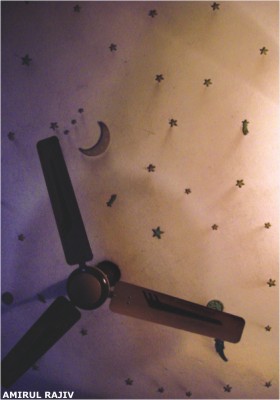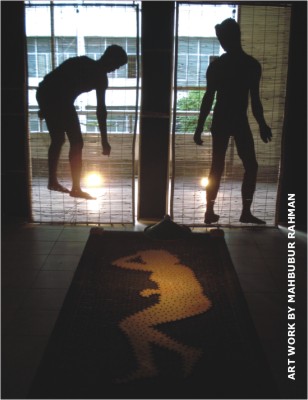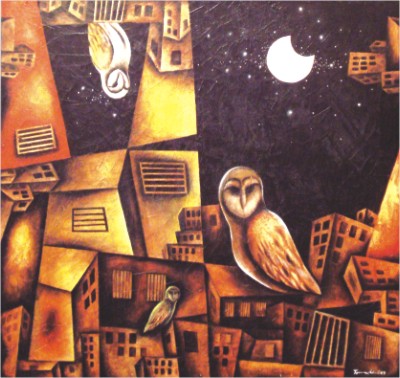
Inside
|
Long summer nights Rumi Ahmed describes the heat of high-rise living when the mercury boils
If you somehow manage to stand in the balcony and try to look out through the clothes hung for drying, your vision will be obstructed at two feet distance by another multistory building that houses 24 more families. The windows on one side of the house are almost of no use, thanks to the neighbour's flat which is built with no gap between the buildings. Dhaka has an estimated weeknight population of 8 million. My guess is that the majority of this 8 million probably live in conditions I have just described. While we remain very concerned about socialist or socialism-leaning nationalism, tangential dealings with Islamism, reforms and revolutions, idealism turned populism, etc, the members of the average family have different, "less important" things to be concerned with. If you go and talk to any member of that family, they will only tell you about the hell they live in without having committed any crime. These days, the mercury has risen beyond 40°C in parts of Bangladesh. When this happens, those closed airtight boxes called "flats" turn into hot ovens. The souls living inside those pits are roasted nightly, even when the ceiling fan tries unsuccessfully to shed some relief. And lately, with regular load-shedding, the hell gets uglier. Most of you who read this will never feel how unbearable it can be to pass those sleepless hot humid nights, unless you yourself lived that life.
The father, who runs the family with the income of his modest job, is captivated by the thought of his imminent retirement. In the face of perpetual humiliation of shrinking ability due to skyrocketing prices of the essentials, he remains angry most of the time. And, to his eternal dismay, the anger will always, uncontrollably and unduly, be vented on the children at home. Despite all the daily humiliations, angry outbursts, inherent hopelessness, he dreams of a little piece of land and a house of his own. His lazy times pass in trying to solve an impossible arithmetic. The arithmetic is of building the dream home, saving for his daughters' marriages, and sending the son abroad with the nominal retirement fund that is going to be available soon. If you feel bad at the misfortune of this family, you should not walk through the slum down the road. Small shanty houses made of packing boxes and sacks shelter a family of six, the oldest one is 28 and the youngest one is three months old. Let's keep them to be discussed some other day.
Now, if you want to think of issues related to Bangladesh, her problems and pangs, think of that college-going girl. She, with her traditional salwar-kamis-orna, is roasting every night in an unbearable, cruel, living condition. For her, the future is to move to a similar box as a housewife, and then as a mother only to be assigned to the kitchen, the hottest place in the oven. And for the struggling uncle or the boys of the family, what do they have for the future? Live the rest of the life in this 500 sq. foot box? Or, at any cost, become deshantori through the roughs of the Mediterranean or crisscrossing the arid deserts? Or should they try to change the star at home, following the path some guys named Giasuddin al Mamun or Tokai Shagor or Pichci Hannan, etc tried? Folks, what solution do you have that will bring some comfort in the life of these 80%? What would be your advice that will help them change their stars? Any answer, my friends? The members of the family keep waiting for the unbearable sleepless nights to be done and over with. But these summer nights are way too long. Dr. Rumi Ahmed, a US-based physician , is a member of Drishtipat Writers’ Collective. |
 T
T But at least we can try to imagine. Just think of the girls at home during one of those load-shedding nights. Dad and the boys can remain bare bodied with shorts or a lungi on. But girls would still adhere to the modest dress code of a Bangladeshi middle class family. The thing called hatpakha (hand fan) will be moving with the beat of the heart, only for some relief from the unbearable heat and humidity. For them, there is, in fact, no place to escape from the oven. The roof is locked by the landlord. The road in front is already crowded by street people, where the members of the family we are talking about are neither welcome nor safe. You will put yourself under the shower to cool down? That is not going to happen. There is water rationing and, above that, as there is no electricity, there is no water supply.
But at least we can try to imagine. Just think of the girls at home during one of those load-shedding nights. Dad and the boys can remain bare bodied with shorts or a lungi on. But girls would still adhere to the modest dress code of a Bangladeshi middle class family. The thing called hatpakha (hand fan) will be moving with the beat of the heart, only for some relief from the unbearable heat and humidity. For them, there is, in fact, no place to escape from the oven. The roof is locked by the landlord. The road in front is already crowded by street people, where the members of the family we are talking about are neither welcome nor safe. You will put yourself under the shower to cool down? That is not going to happen. There is water rationing and, above that, as there is no electricity, there is no water supply.